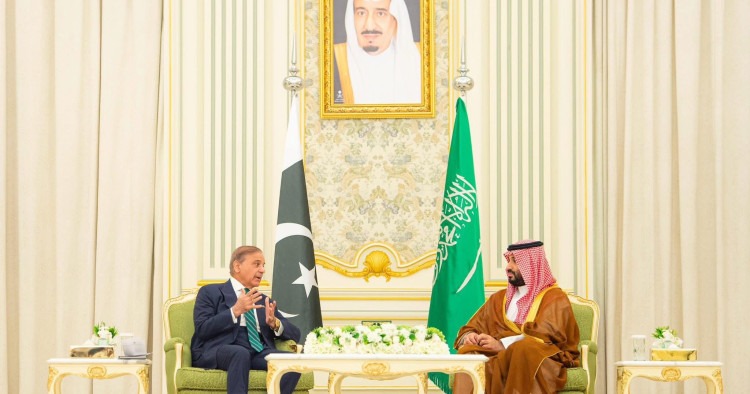On September 17, 2025, the Government of Pakistan and the Kingdom of Saudi Arabia signed the Strategic Mutual Defence Agreement (SMDA) in Riyadh that provides that an act of aggression against one of the states will be regarded as aggression against another state. The accord represents the largest codification of the Pakistan-Saudi defence relations to date. It is a significant reinforcement of a relationship that has been one of the pillars of Gulf security. As far as Islamabad is concerned, the agreement makes it a more significant participant in the Gulf security than an external actor and transforms decades of bilateral collaboration into a treaty mechanism.
Moreover, the Agreement is a larger regional response to the trend of security self-sufficiency, with the Middle Eastern states, especially the Gulf countries, becoming more and more responsible in their defence. This is a positive trend that can contribute to the burden-sharing policy that is encouraged by the Trump administration. In this respect, the SMDA demonstrates new rules of collective responsibility in the context of the recent security order in the Middle East. The involvement of Pakistan in this structure gives the country an important outside of South Asia and makes it a stabilizing partner in Gulf security and the wider region.
This is evident in recent regional developments. Gulf states are not stepping back from their security cooperation with the US, but rather diversifying their security options, as shown by the strengthening defence ties between Qatar and the United States, especially following the Israeli attack of September 2025 in Doha. Reports suggest KSA is interested in signing defence pact akin to the executive order Trump signed on Qatar, in upcoming meeting between Saudi Arabia‘s Crown Prince Mohammed bin Salman and US President Donald Trump. Riyadh’s outreach to Islamabad, therefore, complements Doha’s alignment with Washington, both indicating a regional trend of favouring overlapping, multi-source security arrangements instead of relying on a single guarantor.
Historical Continuity and Institutionalization
Pakistan-Saudi defence relations are longstanding. They began forming in the early to mid-1960s when Saudi Defence Minister Prince Sultan bin Abdulaziz signed a security cooperation agreement with Pakistan, which marked the start of Pakistani military advisors and trainers integrating into the Kingdom’s military forces. It became much closer after the 1982 Defence Cooperation Agreement, which introduced Pakistani posting and defined a system of formal training courses, which led to the training of thousands of Saudi officers in Pakistani military institutions. This cooperation has been backed by actions, such as in the Gulf War in 1991, when Pakistani troops were deployed to secure strategic sites such as oil fields, religious holy places in Saudi Arabia, demonstrating the strength and credibility of the partnership during a crisis.
The Gulf Region and Regional Responsibility.
Moreover, land, air and sea interoperability have now become the norm due to bilateral exercises over the years. Counter-terror efforts and combined land operations have been the main elements of the Al-Samsam series, which was last held in 2024 at Muzaffargarh, and a naval exercise, Naseem al-Bahr, initiated in 1993, has been developed into a sea-air integration program. In early 2025, the fifteenth edition of this exercise involved live-fire and anti-surface warfare exercises in the North Arabian Sea. These engagements, in conjunction with the consistent presence of Pakistani military advisors, demonstrate that the security relationship between the two nations is well established. The SMDA further strengthens these relationships.
The justification of the SMDA is the fact that Gulf security is constantly recalibrated with regional actors getting more responsibility to provide their own defence as opposed to being dependent on others all the time. A lot of the discussion around the agreement has considered it as a hedge to diminishing American influence, without taking into account the larger paradigm shift in progress. The agreement can be regarded as a component of a localized burden-sharing model, which would strengthen collective deterrence by intra-regional cooperation.
Concerning Riyadh, the deal expands its strategic portfolio, which is not dependent on any power, but at the same time, it enhances its vision of becoming a leader in an independent and more autonomous Gulf security system. With Islamabad, it offers a chance to institutionalize its long-term relationship as a stabilizer of the region. Moreover, Pakistan’s historic experience of Gulf defense participation, be it in terms of manpower contribution or training on counter-terrorism issues, has largely remained in its shadow. The SMDA is an appreciation of this contribution and at the same time makes certain that the partnership is founded on the basis of a treaty.
SMDA shows a wider trend in the region, focusing on multi-vector security cooperation. Other than the Saudi-Pak treaty, other regional mechanisms are also present, like joint Arab air defence, Red sea maritime task forces, GCC information platforms, and all these have shown that the regional security arrangements have become normal. In this respect, the SMDA also brings in a new aspect of coherence, linking the military capabilities of Pakistan to the security of the Gulf.
Charting a Horizon
The Pakistan-Saudi defence agreement is both continuity and change: continuity in institutionalizing a partnership that is established on decades of mutually trusting and successful relationships, and change in terms of the balance of power in the region. To Islamabad, it will mean that it is a credible security provider in the Muslim world and a state that can meet its defence requirements without depending on others. In the case of Riyadh, it will provide a reliable ally that has demonstrated operational discipline and professionalism, which will allow Saudi Arabia to realign its security platform and enhance its central contribution to the stability and security of the Gulf region.
The connotations are thus two-fold. At the strategic level, the agreement shows that regional security could be established on the basis of enhancing regional relationships. Conversely, it shows the readiness of Pakistan to act as a stabilizing power on the outside of its geographical borders and also balances its relations with Iran, Turkey, and the Gulf Cooperation Council (GCC) in general. It is notable that the Iranian President Masoud Pezeshkian supported the pact in his speech at UNGA. Adding to this, Ali Larijani, the Secretary of the Supreme National Security Council of Iran, also stated that Iran would support the deal and stated that the Pakistan-Saudi deal is a manifestation of the brotherhood spirit and Iran is happy that the accord would contribute to the collective security of the region. This marks the dawn of a comprehensive regional security system, which can be used as a vehicle of confidence-building, peace, and security in the region.
Syed Ali Abbas is Research Officer & Comm Officer at the Center for International Strategic Studies (CISS) Islamabad. He is also an MPhil scholar in the Department of Strategic Studies at the National Defense University (NDU) Islamabad.






